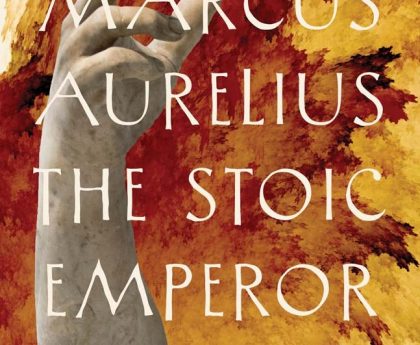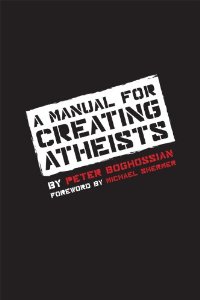 Dr. Peter Boghossian’s new book “A Manual For Creating Atheists” inspired deep reflection concerning the way I present myself when engaging in real-world activism, participating in formal debates, and challenging religious beliefs in face-to-face conversations.
Dr. Peter Boghossian’s new book “A Manual For Creating Atheists” inspired deep reflection concerning the way I present myself when engaging in real-world activism, participating in formal debates, and challenging religious beliefs in face-to-face conversations.
I thoroughly enjoyed reading the final copy of Dr. Peter Boghossian’s new book “A Manual for Creating Atheists” which I had the pleasure of editing. I first communicated with Dr. Boghossian following pieces I had authored in early 2012. Boghossian contacted me, we chatted through e-mail, and we eventually conversed on an early episode of the NEPA Freethought Society Podcast.
Boghossian’s book, while it touches on such arguments, proposes a radical shift in conversations between atheists and religious individuals: a move away from discussion of metaphysics (the nature of existence) and facts to discussion about epistemology (how one knows that one purports to know) and faith.
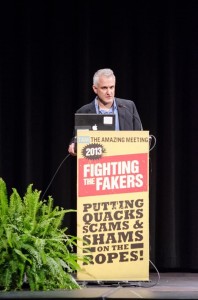
Since reading and reflecting on Boghossian’s book, I have moved the focus of my conversations with religious individuals from metaphysics and facts to discussion of epistemology – insisting theists explain how they come to their belief and critiquing the methodology by which they arrive at belief. Most notably, as Boghossian mentions, atheists ought to focus on the core of theistic belief, religious faith – a mechanism which Boghossian rightly considers an unreliable means of arriving at truth.
Boghossian — drawing upon psychological research and literature — stresses that those who seek to challenge religious belief avoid forming adversarial relationships with theists – noting that people ‘turned off’ by discussion are less likely to listen and experience a cognitive shift.
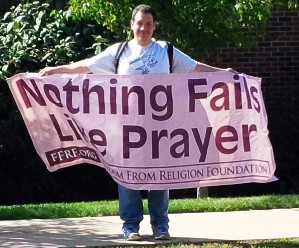
Throughout my career of atheist activism and activism for the separation of church and state, I have worked with organizations displaying messages which may have led to adversarial relationships (read more about this here and here). Perhaps a more ‘gentle’ message, veering away from “Nothing Fails Like Prayer” and moving toward simply the word “Atheists” [although mere mention of the word ‘atheist’ is considered “attacking religion” by a solicitor of a transit authority and impermissible for an advertisement], can lead to more positive engagement?
It often seems like the content of messaging atheists employ does not matter in the eyes of many religious individuals who will claim offense and resort to acts of vandalism – most recently, [attempted] aggravated arson. More ‘biting’ messages, too, may often lead to increased conversation — especially with the help of media coverage — while more ‘benign’ messages may be ignored. Perhaps ‘biting’ messages can ‘rally the troops’ and appeal to certain demographics of atheists while more diplomatic messages may be considered uninteresting.
While there are many good arguments for both ‘diplomatic’ and ‘firebrand’ approaches, I find Boghossian’s plea for atheists to avoid adversarial relationships more relevant when considering face-to-face conversations which are usually much more in-depth than engagement with a billboard or banner.
My recent recorded open-to-the-public discussion with Pastor Dan Nichols, for instance, was much different than my recorded open-to-the-public debate with Pastor Michael Brewster – mainly because of the format. While I enjoyed both formats and the content within, I found my discussion with Pastor Nichols — largely informed by Dr. Peter Boghossian’s book — to be more productive.
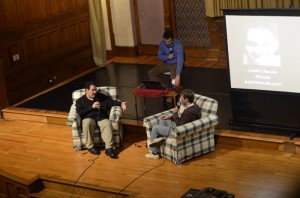
Photo by A. Elizabeth Baumeitster
Audience members attending the discussion with Pastor Nichols — compared with those who attended the debate with Pastor Brewster — participated more, were more engaged, and pursued conversation with me following the event. The open style of conversation with Pastor Nichols allowed for more exploration, was less formulaic, and more spontaneous. Debate, by its nature, is a more adversarial format – pitting one person ‘against’ the other as opposed to conversation which allows people to talk with each other.
Dr. Boghossian’s book is very worthwhile – a breath of fresh air in the body of skeptical and atheist literature, tackling topics seldom discussed. Words from pages in his book have inspired change within this atheist.
Learn more about Dr. Peter Boghossian and his book by listening to his discussion with Karla Porter and I on Brave Hero Radio. Consider purchasing his book which is available on various platforms.
As always, feel free to comment below.
